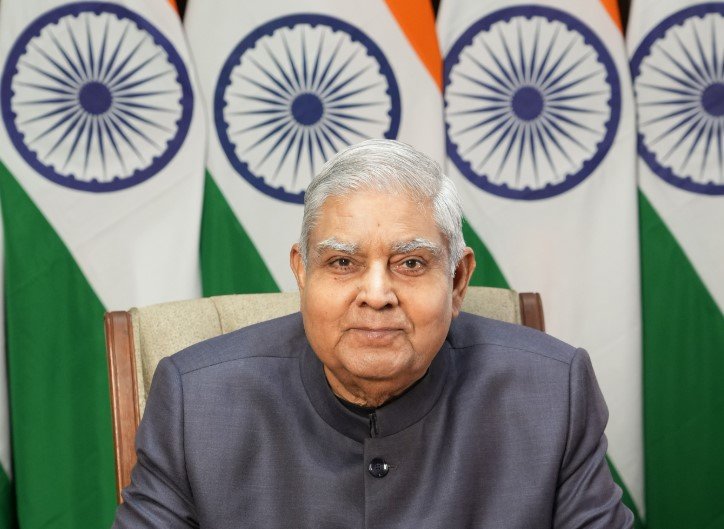Vice President’s Tenure Marked by Sharp Critiques of Supreme Court’s Role in NJAC Ruling, Judicial Appointments
Jagdeep Dhankhar’s sudden resignation as Vice President late Monday night capped a turbulent tenure defined as much by constitutional rhetoric as by political brinkmanship. His nearly three-year term will likely be remembered for his persistent public disagreements with India’s top court, a stance that raised eyebrows across party lines and within the legal fraternity.
A career lawyer-turned-politician, Dhankhar, 74, often positioned himself as a vocal defender of parliamentary supremacy—especially in his critiques of the judiciary’s role in striking down the National Judicial Appointments Commission (NJAC) Act. His tenure as Chairman of the Rajya Sabha was characterized by frequent flashpoints involving the basic structure doctrine, judicial independence, and the boundaries of constitutional roles.
From Kolkata to the Capital: A Friction-Filled Rise
Before moving to the Vice President’s residence in New Delhi, Dhankhar served as the Governor of West Bengal, where he had a famously antagonistic relationship with the Mamata Banerjee-led Trinamool Congress. That combative energy followed him into the upper house of Parliament.
When he assumed the Vice Presidency in August 2022, few anticipated how openly he would confront India’s judiciary. Just four months into his term, Dhankhar ignited controversy during the Winter Session of Parliament by openly challenging the Supreme Court’s 2015 ruling that struck down the NJAC Act.

“A glaring instance of parliamentary sovereignty being compromised,” he called the verdict in his December 7, 2022 address.
The comment was not an offhand remark. He had already raised the issue earlier that month and continued to revisit it throughout his term, often returning to the theme of legislative primacy versus judicial activism.
April 2025: A Turning Point
The friction between Dhankhar and the judiciary intensified this April, when a High Court judge was found with large wads of unexplained cash at his residence. The incident, though officially under investigation, gave Dhankhar fresh ammunition to question judicial accountability.
Though he refrained from naming the judge or the High Court, his comments in the Rajya Sabha hinted at systemic failure.
“Who watches the watchdogs?” he asked rhetorically, prompting a stern but carefully worded response from retired judges and legal experts who emphasized the separation of powers.
A Vice President Like Few Others
Dhankhar’s style often diverged from the traditional Vice Presidential demeanor, which tends toward quiet constitutional stewardship rather than polemical engagement.
Instead, he:
-
Frequently challenged the Collegium system as opaque and unaccountable
-
Invoked Parliament’s “ordainment by the people” to argue for judicial reform
-
Insisted that the NJAC verdict weakened democratic legitimacy
-
Called for “quietus” to public disagreements between institutions
His statements occasionally echoed sentiments from the executive branch. A month before his first NJAC remarks, then-Law Minister Kiren Rijiju called the Collegium system “alien to the Constitution.” While critics saw Dhankhar’s views as extensions of the government’s frustrations, supporters argued he was simply restoring balance between the three pillars of democracy.
Institutional Friction or Constitutional Reckoning?
Legal observers say Dhankhar’s confrontational tone rekindled a dormant but potent debate about judicial supremacy and democratic oversight in India. The 2015 NJAC verdict reaffirmed the basic structure doctrine, placing limits on Parliament’s power to alter key constitutional principles.
Table: Timeline of Key NJAC and Judiciary Events
| Year | Event | Impact |
|---|---|---|
| 2014 | NJAC Act passed | Created new system for judge appointments |
| 2015 | Supreme Court strikes down NJAC | Reinstated Collegium system |
| 2022 | Dhankhar becomes VP | Criticizes SC ruling as “undemocratic” |
| 2023–2024 | Frequent speeches on judicial overreach | Tensions with judiciary deepen |
| 2025 | Cash found at judge’s home | Dhankhar renews calls for reform |
Political Undertones and Possible Futures
Dhankhar’s departure comes amid speculation about his next political move. While his resignation letter cited “personal reasons,” sources in the BJP say he may be preparing for a more active role ahead of the 2026 Lok Sabha elections—either as a senior statesman or potentially even as a candidate.
Critics, including several Opposition leaders, argue his resignation was timed to avoid a fresh controversy brewing over his latest remarks. Others see it as a calculated withdrawal in the face of mounting legal and institutional scrutiny.
Why It All Still Matters
In a country where the separation of powers is both a constitutional ideal and a practical tightrope, Dhankhar’s tenure may have set new precedents—good or bad, depending on the observer. While no Vice President in recent memory so persistently questioned the judiciary’s role, few have also so forcefully advocated for “parliamentary sovereignty”.
As the debate around the NJAC, the basic structure doctrine, and judicial reform continues, Dhankhar’s interventions will remain part of the broader discourse shaping India’s evolving constitutional identity.
Quick Recap: Jagdeep Dhankhar’s Top Contentious Moments
-
2022: Criticized Supreme Court’s NJAC ruling in Parliament
-
2023: Repeatedly questioned Collegium system in speeches
-
2025: Used judge cash scandal to press for judicial accountability
-
July 2025: Abrupt resignation as Vice President
